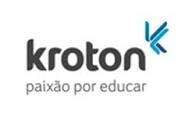Kroton Educacional
 | |
| Sociedade Anônima | |
| Traded as |
Ibovespa Component |
| Industry | Higher education |
| Founded | 1966 |
| Headquarters | Belo Horizonte, Brazil |
Key people |
Evando José Neiva, (Chairman) Rodrigo Galindo, (CEO) |
| Revenue |
|
|
| |
Number of employees | 36,000 |
| Website |
www |
Kroton is the largest private educational company in the world and was founded in 1966 in Belo Horizonte. It has operated for over 45 years in all educational segments, such as preschool, elementary, secondary, adult high school, college preparatory school, free courses, and other related educational activities, as well as higher, professional, and post-graduation education.
Descriptions
Kroton has more than 1.9 million students, with 290,000 students in basic education in 213 campuses and 726 poles divided into 22 educational brands located in all Brazilian states. The company is the largest in world in undergraduate.
The company is also involved in the distribution, wholesale, retail, import, and export of textbooks, course books, magazines, and other publications. In addition, it engages in the licensing of school-related and pedagogical products. The company operates 21 own campuses under the Pitagoras brand; ten under the Unic brand; five under the Unopar brand; and ten under the Unime, Ceama, Unirondon, Fais, Fama and União brands in ten Brazilian states. It also operates 804 associated schools in Brazil under the Pitagoras brand, as well as five partner schools in Japan and a partner school in Canada.
It is the largest Brazilian company in the higher education segment by number of students and revenue. In July 2014, the company merged with its largest competitor Anhanguera Educacional becoming the largest higher educational company in the world by market capitalisation.
In July 2016 the company attempted a merger with its largest competitor at the time, Estácio S.A. The General Superintendency of CADE, the Brazilian antitrust agency, studied the possible effects of the merger, stating that they consider it “an operation with potential to cause anti-competitive effects in the markets of on-site and distance higher education”.[2] In June 2017, CADE's Tribunal voted 5-1 to veto the merger. Kroton stated that it “respects the final decision of the regulatory agency not approving the operation and, thus, both companies will keep operating independently, with individual listings in the Novo Mercado of B3”.[3]
References
- 1 2 List of Public Companies Worldwide
- ↑ Lis, Laís (2017-02-03). "Superintendência do Cade diz que união entre Kroton e Estácio é anticompetitiva" [CADE superintendency says Kroton-Estácio merger is anticompetitive]. G1 (in Portuguese). Brasília. Retrieved 2017-03-10.
- ↑ Martello, Alexandre (2017-06-28). "Cade reprova compra da Estácio pela Kroton Educacional" [CADE vetoes buyout of Estácio by Kroton Educacional]. G1 (in Portuguese). Brasília. Retrieved 2018-05-17.